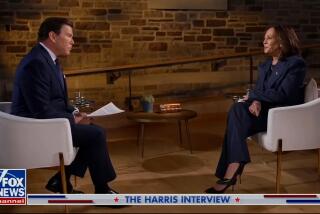Clinton makes talk-show rounds
- Share via
WASHINGTON — Sen. Hillary Rodham Clinton reinforced her position as the Democratic presidential front-runner Sunday as she executed the rare feat of appearing on all five major TV talk shows in one morning, defending her new healthcare proposal and vowing to oppose any Iraq war funding unless it is tied to starting a U.S. troop withdrawal.
“I will not vote for any funding that does not move us toward beginning to withdraw our troops, that does not have pressure on the Iraqi government to make the tough political decisions that they have, that does not recognize that there is a diplomatic endeavor that has to be undertaken,” the New York Democrat said on “Fox News Sunday.”
President Bush plans to ask Congress this week for nearly $200 billion to fund the war through the end of next year.
Clinton -- who holds a 22-point lead over her closest rival, Sen. Barack Obama of Illinois, in the latest national Gallup Poll on the Democratic presidential field -- did not criticize her opponents for the party nomination. Instead she focused on her general-election prospects, highlighting her success in winning Republican and independent votes in her two Senate races.
“Anyone who gets the Democratic nomination is going to be subjected to the withering attacks that come from the other side,” Clinton said on NBC’s “Meet the Press.” “I think I’ve proven that I not only can survive them but surpass them.”
Appearing on “Fox News Sunday” for the first time in more than three years -- and almost exactly a year after former President Bill Clinton had an angry confrontation on the show with host Chris Wallace over attempts in the 1990s to capture Osama bin Laden -- the senator laughed loudly when asked why she and her husband “have such a hyper-partisan view of politics.”
“Well, Chris, if you had walked even a day in our shoes over the last 15 years, I’m sure you’d understand,” she said. “But you know, the real goal for our country right now is to get beyond partisanship, and I’m sure trying to do my part, because we’ve got a lot of serious problems that we’re trying to deal with.”
Clinton took to the airwaves Sunday after unveiling her long-awaited healthcare proposal, the American Health Choices Plan, last week. It would require everyone to have medical insurance and would offer tax credits to those who can’t afford it. Half of the program’s $110-billion-a-year price tag would come from savings she says she can squeeze from the current healthcare system, which she calls bloated and inefficient. The rest would come largely from repealing tax cuts for those earning more than $250,000 a year.
“It is not only a moral imperative that we try to cover everyone, it is now an economic necessity,” she said on “Meet the Press.”
Clinton dismissed criticism from Republican presidential candidate Rudolph W. Giuliani that her healthcare plan amounted to “socialized medicine.” She said it created no new federal bureaucracy and addressed a crucial problem.
“I’m waiting for any Republican candidate to come out with a plan that can be really scrutinized, that we can ask hard questions about,” she said on ABC’s “This Week.” “It seems as though they’re in the ‘just say no’ category, and I don’t think that’s good for the country.”
But Iraq was the focus of much of the interviews. Clinton again defended her 2002 vote authorizing the use of military force against Iraq. Many antiwar activists have called for her to apologize for that vote.
“I cast a sincere vote based on my assessment at the time, and I take responsibility for that vote,” she said on “Meet the Press.”
She continued: “It’s fair to say that the president misused the authority that he was given, and if I had the opportunity to act now based on what I know now, I never would’ve voted that way.”
Clinton also would not directly criticize the liberal group MoveOn.org for its recent full-page ad in the New York Times referring to Army Gen. David H. Petraeus, the U.S. commander in Iraq, as “General Betray Us.” Republicans condemned the ad, and Bush said Democrats were afraid to criticize the group because of its liberal clout.
“I don’t condone attacks by anyone on the patriotism and service of our military,” Clinton said on CNN’s “Late Edition.” “But let’s be clear here. This debate should not be about an ad. This debate should be about the president’s failed policies.”
Asked on CBS’ “Face the Nation” whether her husband would have a policy role if she is elected president, Clinton responded, “No. No.”
“Among the many lessons that I have learned, we want to be sure that the president, my husband, does whatever he can, just as I tried to do whatever I could, and I think he has a very special and important role in reaching out to the rest of the world,” she said.
Appearing on all five major Sunday talk shows -- the political equivalent of hitting for the cycle in baseball -- is known among TV producers and political operatives as a “full Ginsburg,” after the first person to pull it off, Southern California attorney William H. Ginsburg. He made the circuit on Feb. 1, 1998, in defense of his client Monica S. Lewinsky, the onetime White House intern at the center of a Bill Clinton sex scandal.
Ginsburg had to scurry from studio to studio that day; Clinton taped her appearances from her home in Chappaqua, N.Y.
Only high-profile guests in the midst of major news events have the cachet for the five-show circuit. Those who have done it include then-vice presidential nominee Dick Cheney during the 2000 Republican convention; Sen. Joe Lieberman of Connecticut, then the Democratic vice presidential candidate, during the 2000 Florida recount; and then-Secretary of State Colin L. Powell during a nuclear weapons showdown with North Korea in 2002. Giuliani and then-Rep. Rick Lazio (R-N.Y.) also did it in 2000 in their race against Clinton for the Senate.
--
More to Read
Get the L.A. Times Politics newsletter
Deeply reported insights into legislation, politics and policy from Sacramento, Washington and beyond. In your inbox twice per week.
You may occasionally receive promotional content from the Los Angeles Times.











